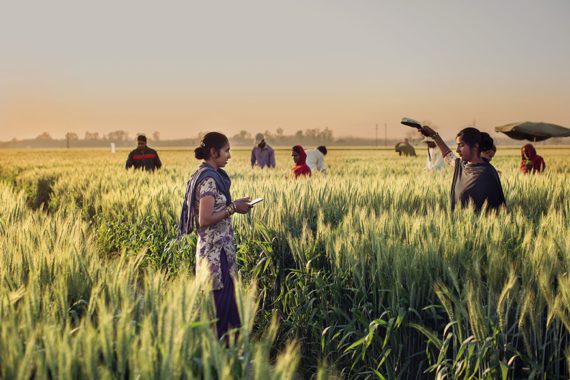Bread for the World has supported the goals of Feed the Future, the U.S. government’s flagship global food security initiative, since its launch in the wake of the 2007-2008 food price crisis. The crisis made it clear that significant agriculture investments are essential to ending hunger.
In lower-income countries, strengthening the agricultural sector–for example, by equipping smallholder farmers to grow more food and a wider variety of foods—has proven to be the most effective way to reduce extreme poverty. In recent years, there has been an increasing focus on agricultural research and innovation, mainly spurred by the dramatic impacts of climate change on farming in many parts of the world.
The Feed the Future Innovation Labs program coordinates efforts by researchers at dozens of U.S. universities. The goal is to advance knowledge in sustainable agriculture and other areas that support farmers in their efforts to secure their own food security and that of their communities.
Bread has been working to learn more about these Innovation Labs, their successes, and their needs. The information gathered includes views expressed in interviews with researchers and collaborators at Innovation Labs that focus on nutrition, food systems, irrigation, soybeans, and poultry genomics, among others.
One of the most frequently discussed topics in the interviews is the question of how the Innovation Labs’ work is compiled, synthesized, disseminated, and advanced. Research inherently takes time to complete, and grant awards for Innovation Labs are made in five-year increments. It is essential for agricultural research projects to have continuity so that their findings and recommendations are credible and valid. It is also essential to share the results of completed research with other stakeholders in the agricultural sector, including officials at ministries of agriculture, scientists, extension agents, civil society organizations, farming collectives, and smallholder farmers in Feed the Future countries and other lower-income countries affected by climate change.
Another point raised in interviews is the importance of gathering and acting on communities’ priorities and assessments. People farming in areas impacted by climate change have a concrete understanding of their ongoing and new challenges. It is vital for the U.S. Agency for International Development (USAID), which manages the Innovation Labs program, to make decisions about research and programs that are rooted in local realities—realities that are well understood from firsthand experiences with farmers and people affected by hunger and malnutrition.
USAID Administrator Samantha Power has stated publicly that USAID is committed to increasing its local engagement efforts to 25 percent of all funding. Connecting with local communities, particularly with people facing hunger and malnutrition, was also a theme of the recent Devex World 2022 event. Speakers who emphasized this point included Dr. Deborah Birx, former Global AIDS Ambassador and former White House Coronavirus Response Coordinator, and Kristalina Georgieva, managing director of the International Monetary Fund.
Bread heard from researchers at the Innovation Labs about the importance of investing in efforts to build relationships between U.S. researchers and farming communities. Tufts University’s Nutrition Innovations lab carried out a project between 2010 and 202 that focused on both answering research questions on topics such as stronger linkages between nutrition and agriculture and better nutrition for pregnant women, and on building additional local capacity to carry out nutrition programs, including strengthening skills such as research methodology and strategies for community outreach. More than 60 global, regional, and local institutions and 5,000 stakeholders in focus countries participated in the Nutrition Innovations lab project.
Ending hunger is within our reach. Bread emphasizes that, while it is evident that it will take many more improvements and reforms to end hunger for good, the world can produce and distribute enough food for everyone.
Hunger is now less a problem of knowledge and technology and much more a problem of human priorities. One way of making progress is through consistent efforts to improve collaboration to reflect the most critical priorities—sharing knowledge widely and ensuring that local voices are well represented as solutions are developed.
Christina Ahn is the Feed the Future Innovations intern with Bread for the World.



